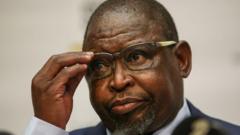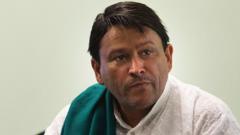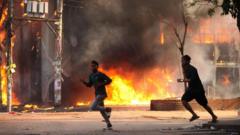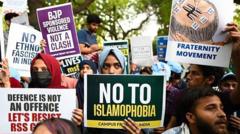Muhsin Hendricks, recognized as the world's first openly gay imam, was tragically shot in Gqeberha, South Africa, leaving a significant void in the LGBTQ+ community and provoking a complex dialogue on acceptance within faith-based contexts. As supporters mourn and remember his contributions towards LGBTQ+ affirmation in Islam, concerns grow over safety for sexual minorities while calls for continued advocacy persist.
Legacy and Loss: The Impact of the First Openly Gay Imam in South Africa
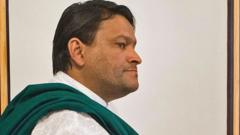
Legacy and Loss: The Impact of the First Openly Gay Imam in South Africa
The brutal killing of Muhsin Hendricks, a trailblazing gay imam in South Africa, has spurred fear in the LGBTQ+ community while igniting a renewed commitment to fight for equality in religious circles.
The execution-style killing of Muhsin Hendricks, celebrated as the first openly gay imam, has sent ripples through South Africa's LGBTQ+ community, inciting both fear and a determination to combat ongoing marginalization within religious spaces. Revered by many, Reverend Toni Kruger-Ayebazibwe described Hendricks as a "gentle spirit" whose absence has created a considerable void. She emphasized the collective grief felt among queer Muslims worldwide following his untimely death on Saturday in Gqeberha.
Hendricks, 57, was reportedly shot while on his way to officiate marriages for two interfaith heterosexual couples, contrary to initial reports that he was officiating a gay wedding. His organization, the Al-Gurbaah Foundation, clarified the nature of his visit, highlighting Hendricks' willingness to challenge conventional norms just moments before his death. Traditional imams often refuse to perform marriages that cross religious lines, yet Hendricks showed a commitment to inclusivity.
With South Africa being the first African nation to legalize same-sex marriage in 2006, the country's LGBTQ+ rights landscape has been multifaceted. While some religious bodies endorsed his work and condemned his murder, conservative factions within Islam continue to view same-sex relationships as incompatible with religious teachings, often disavowing figures like Hendricks by denying him recognized religious titles.
Despite ongoing legal protections for LGBTQ+ individuals, the community still confronts violence and societal stigma. Only a handful of religious groups, such as the Dutch Reformed Church and the Methodist Church of Southern Africa, have developed more inclusive policies. However, challenges remain as many religious interpretations continue to exclude LGBTQ+ members, leaving the struggle for acceptance within faith communities alive and ongoing.
Following Hendricks' death, social media has also reflected a troubling backlash, with hostile commentary surfacing that Dr. Fatima Essop, a senior Islamic Studies lecturer, aptly described as distressing. She voiced her disgust at the hateful discourse, noting its stark deviation from core Islamic principles advocating compassion and life preservation. Eschewing any justification for violence, she raised concerns regarding the implications of Hendricks' murder on the willingness of LGBTQ+ individuals to express their identities.
In the wake of this tragedy, LGBTQ+ leaders find themselves reconsidering safety protocols, yet they remain resolute in their mission, recognizing that Hendricks’ contributions toward inclusivity signify a legacy that cannot be erased. While mourning his loss, they seek to honor his memory through continued advocacy for equal rights. Hendricks has already been laid to rest, with plans for a memorial to celebrate his substantial impact on LGBTQ+ life in South Africa solidifying as next steps in the community's journey toward acceptance and acknowledgment.




